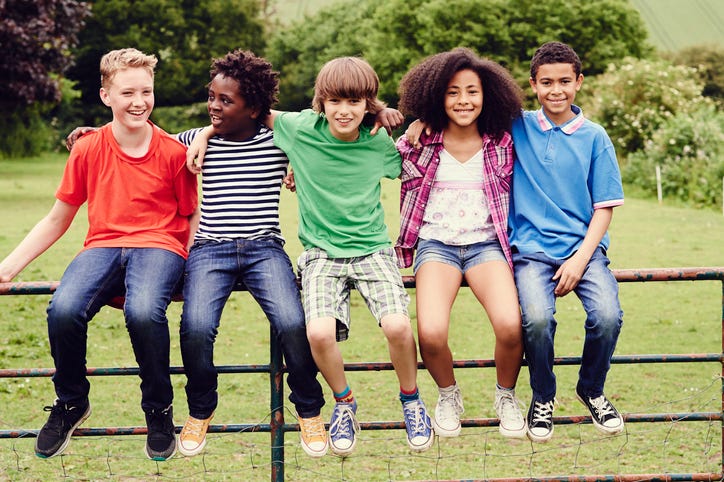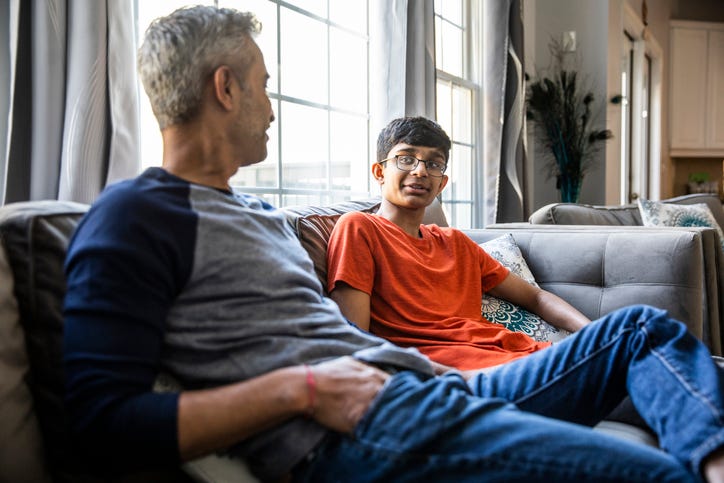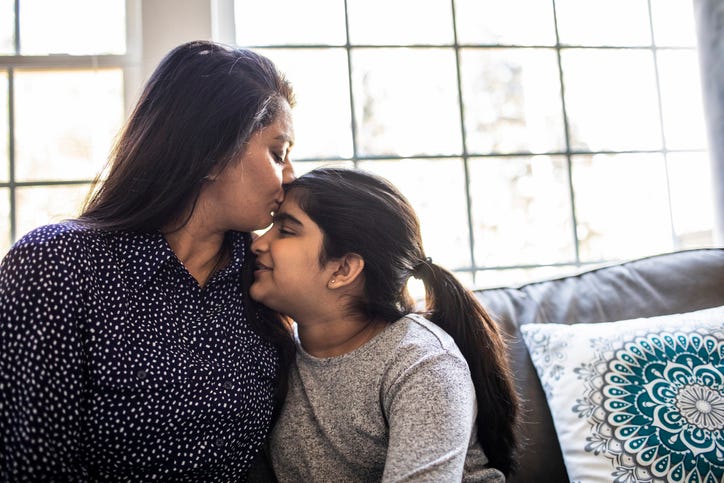Book Research Roundup: Fatphobia During Puberty
Supporting kids in all bodies as they transition to adolescence.
Quick housekeeping note: No Tuesday essay and no Friday Thread next week because I’ll be on spring break! We do have a fun Burnt Toast/Comfort Food podcast rerun planned for you though. We’ll get back to regular newsletter programming Tuesday, April 19.
It’s time for your monthly book research roundup! This month I’ve been working on my chapter about puberty. We started the conversation here, and you folks blew up that thread and my inbox with your stories about (your own and your kids’) puberty. Thank you!
One major takeaway I had from that conversation: Whether you’re a thin kid who stays thin, a thin kid who gets fat, a fat kid who gets thin, or a fat kid who stays fat or on some other body shape journey… nobody feels completely safe or present in their body during puberty. And maybe that just is what it is? A lot of these changes are disorienting, uncomfortable or downright painful (flashback to 14-year-old me in early endometriosis agony every month). But our cultural taboos and stigmas, especially around large bodies and female or gender non-conforming bodies, makes it all so much worse. And there are so many conversations we’re just not having with kids during these years. And that silence creates a void that’s easily filled by diet culture.
So here’s a roundup of what I’ve been reading as I ponder your stories and the stories of my interview subjects.
A note on gender: This chapter has ended up focused on the experiences of girls and non-binary or trans kids assigned female at birth. But I know boys go through puberty and I know that in some ways we do an even worse job talking to boys about this stage of life! For more on boys, I’ll point you to Peggy Orenstein’s Boys & Sex and Charlotte Markey’s Being You: The Body Image Book For Boys, which comes out in a few weeks and you should preorder now.
CW: Some of the articles I link to use weight-stigmatizing language because science is full of anti-fat bias and so is media coverage about kids’ bodies.

Is Puberty Happening Earlier?
One astute reader noted that conversations around whether the average ages of menarche (first period) and thelarche (breast development) are dropping tend to center the bodies of thin, white kids. And indeed, research that documents a drop in the average age at first menstruation (from around age 14 a century ago to 12) seems to lump everybody together in ways that are super unhelpful.
Some sources say that a diagnosis of “precocious puberty” should be considered when secondary sexual characteristics appear before age 8 for girls and age 9 for boys.
But the American Society for Reproductive Medicine notes that “the first signs of normal puberty in girls can start as early as age 7. African-American girls may have normal puberty signs as early as age 6.” We’re lacking a good consensus on this, probably because research on puberty has not adequately factored in how timelines may differ by race, culture, or social determinants of health.
Still: Research that does track puberty development by race over time in a cohort of over 1200 children finds that the average age of breast development is now 8.8 years old for Black kids, 9.3 for Hispanic kids, and 9.7 for both white and Asian kids, which represents drops of 18 months compared with similar data collected 10-20 years prior. Here is a more recent paper (on a smaller group) by the same authors.
Why Would Puberty Be Happening Earlier?
The conversation around puberty happening earlier is not new. And you won’t be surprised to hear it always gets blamed on the childhood ob*sity epidemic.
Here is (friend of the newsletter and brilliant feminist scholar!) Elizabeth Kissling discussing the leap from younger puberty to fat-shaming for Ms. Magazine back in 2010.
Elizabeth references the concerns that earlier puberty is linked to increased breast cancer risk, and I appreciate the work Frank Biro, MD is doing on that question.
Especially because, when I interviewed Dr. Biro for Scientific American in 2019, he quickly steered away from blaming weight in our conversation, to say: “What we need to ask is, why has BMI gone up?” Yes. Weight changes are often (but not always!) a symptom of something else. Look for the something else and leave kids’ body size alone.

How Do We Support Kids in Puberty?
Whenever puberty happens, kids start getting the message that their body is wrong and possibly unattractive, and yet also ready to be sexualized in a way that may not feel remotely true.
There is some research suggesting that the earlier this starts, the more stress kids feel. (Which seems obvious? If we aren’t good at navigating puberty at the so-called normal time, we are obviously terrible at it when it catches us by surprise?)
But I also want to shout out this study, which followed up with girls who started puberty early a year later and concluded that the kids are alright. (Their mothers, on the other hand!)
More Puberty Feelings
Well, not just puberty, but here’s a feature I wrote about menstrual taboos for Scientific American (also in 2019).
I love Devorah Heitner’s beautiful essay on her mother’s body and her own.
Patrick Burleigh’s experience of precocious puberty at four, and the agonizing decision of whether to prevent it for his own kids.
Carolita Johnson, from puberty to menopause.
Books For Kids
I don’t think we’ve got the perfect, fully weight-inclusive, sex positive, gender affirming puberty book yet. But all of these come pretty close.
Celebrate Your Body (And Its Changes Too!): The Ultimate Puberty Book For Girls by Sonya Renee Taylor. (I absolutely adore Sonya’s work and this book, although the nutrition chapter is one to approach carefully – there is some shaming of processed foods that feels very out of step with the rest of the book.)
(There is also a sequel, but I haven’t read it yet/Sonya is not an author.)
Love Your Body by Jessica Sanders (this one is for girls, but she’s also got one for boys out in the UK and hopefully one day here.)
More Than A Body: Your Body Is An Instrument, Not An Ornament by Lexie and Lindsay Kite. (The Kite sisters came up a ton in our recent thread about redefining beauty. Their work is so important, especially in conservative Christian and Mormon communities with strict standards about girl bodies.)
The Body Image Book for Girls: Love Yourself and Grow Up Fearless by Charlotte Markey. (Some talk of “balance and moderation” in the food section, but also great debunking of many diet culture myths.)
Sex Is A Funny Word: A Book About Bodies, Feelings and YOU by Cory Silverberg. (A great, gender-inclusive introduction to sex, consent, masturbation, gender identity and so much more.)
It’s Perfectly Normal: Changing Bodies, Growing Up, Sex and Sexual Health by Robie H. Harris. (I like this whole series of books about bodies and sex for kids of all ages, but they aren’t particularly gender-inclusive and don’t include any meaningful discussion of body size diversity.)
PS. I’ve also covered fat positive middle grade and YA novels and picture books.





Being told (and repeating) "your body stops growing after puberty" is one of the most damaging lies we can and have tell our selves and our children. It sets us all up to revere the physical for of a 13-15 year old in perpetuity.
This hits very close to home as I parent an AFAB nonbinary adolescent who is terrified of any body change at all, and the way that the world will change how it responds to them. Many nonbinary people they follow are really thin. There aren't a lot of inclusive books out there. Really welcome further writing on this.